Frankly, I have never felt this immersed in an anime premiere since… Sarazanmai back in 2019, and if I look further down the line, it was Flip Flappers in the last quarter of 2016. And these comparisons are not at all coincidences. They all possess strong grips of visual storytelling with bold symbolism to explore deeper psychological turmoil of our teenage protagonists. Their worlds break the boundary of real world logic in service for dream-like state of mind and emotional relevance, and most of all, they are wildly imaginative, original with a resonating emotional backbone. And that is all I could ask for in this medium.
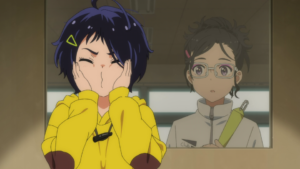
Being bold also means that its style isn’t for everyone and I can see Wonder Egg so far falls for that same pitfalls. As the show jumps back and forth between different realities, it can be difficult to follow at times, especially with some details intentionally left ambiguous. Take this second episode of Wonder Egg for example, as it switches seamlessly between Ai’s real world and the Egg world, I still don’t have a good sense which school she was at when she broke the egg. Her school? Minami’s school? Or is it just a representative of an environment where bullying exists loud and clear? It’s hard to tell them apart. Secondly, exploring heavy themes like bullying and suicide is a double-egded sword. On the one side it gives Wonder Egg a thematic weight that is hard-hitting and powerful, on the flip side the repeated uses of it can become obvious and blatant. For now, Wonder Egg gets away with its “Bullying is bad” themes, but how long can you repeat the same message without feeling pale and repetitive.
This second episode isn’t as inspiring as the premiere for me, as I find the second case is cut off too short to give more time for Ai – Neiru friendship. Even then, this episode still projects many powerful moments. The Egg girl this week is Minami, a timid gym girl gets bullied by her coach to the point she loses her own sense of self-worth. It’s a damn neat topic to explore here, as the toxic relationship between the teachers and students is something much more complex and twisted than peer bullying, but episode 2 still leaves me a lot to be desired (which I will discuss in more details later). It’s interesting to note that we don’t get to see Egg girl’s real life flashbacks but we get the sense of her depression via the world she creates and the depraved exchanges with “The Wonder Killer”. This episode falters a bit on the former but is well executed on the latter. The Egg world here is strangely similar with the first case, especially with those Seeno Evils, the printed footsteps and that escaped door. The second episode does infuse some new ideas to it, with the talking AC fan and the over-the-top big boss being prime examples.
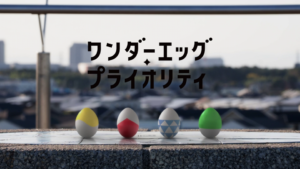
Through the coach’s method of bullying Minami, we can sense how dominant her presence is towards the poor little girl. The psychological effects the coach/adult can influence the kids is something that I’m really into, and Hollywood has touched on that topic before, ranging from sexually charged teacher – student relationship in “Notes of a Scandal” to how the coach can push their kids to breaking point in “Whiplash”. Here in Wonder Egg, sadly it’s a more straight-forward “tough love” treatment that makes the sensei like a maniac wonderbeast. The teacher is an over-the-top, one-sided villain and if I have my say, I would love to know more about their real-life circumstances. But in Wonder Egg’s defense, this villain is a manifestation of Minami’s fears towards her so it makes sense they way it is. On side notes, when it comes to the depiction of bullying in anime, I’ll always hold 3-gatsu in high regards. 3-gatsu not only gives more dimensions to the bullier (something that is extremely hard to do), it knows the way to bring the consequences of bullying in a powerful, yet subtle way (Chiho’s letter to her only friend – Hina – about her process of slowly talking to animals as first step of the treatment still breaks my heart to pieces).
Wonder Egg’s loaded visual symbolism is another highlight and I am here to dissect it one at a time. The imagery of the egg (and egg breaking) is the motif of the show (accompanied by a really good OP) to signify things hidden behind the barriers and the act of breaking the eggs symbolizes the act of overcoming that barrier and becoming your true self. I love how Ai’s hood design makes her look like an egg, for example. The episode’s saddest moment, for me, is again the flashback between Ai and Koito where Ai is unable to defend her friend. Those moments play a neat contrast to Ai and Neiru’s friendship, or the start of it anyways. The Ai and Neiru’s relationship still feels half-baked though, so I am really looking forward to how they are going from here. Reading all this, you might think that I’m not that positive about Wonder Egg but in truth I’m just nitpicking bits and pieces as the rest is my jam. It has natural dialogues, it has attractive character designs and top-notch directions so far with resonate themes and raw emotional power. That’s all I could ask for in an anime.

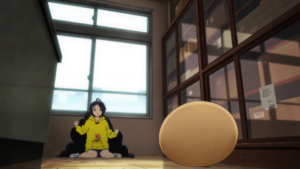
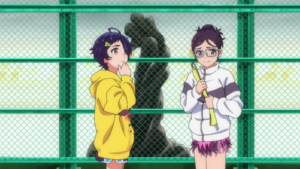
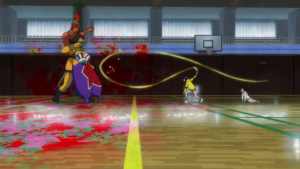
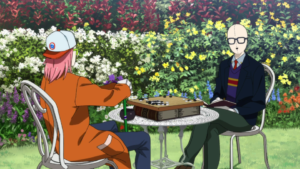
Personally, I have found Wonder Egg far more interesting and compelling than Sarazanmai ever was. It manages to ride that line on the topic its covering and stupid bullshit much better than Ikuhara ever has, and is succeeding for that.
I just hope it doesn’t stumble in its depiction of abuse/bullying/etc